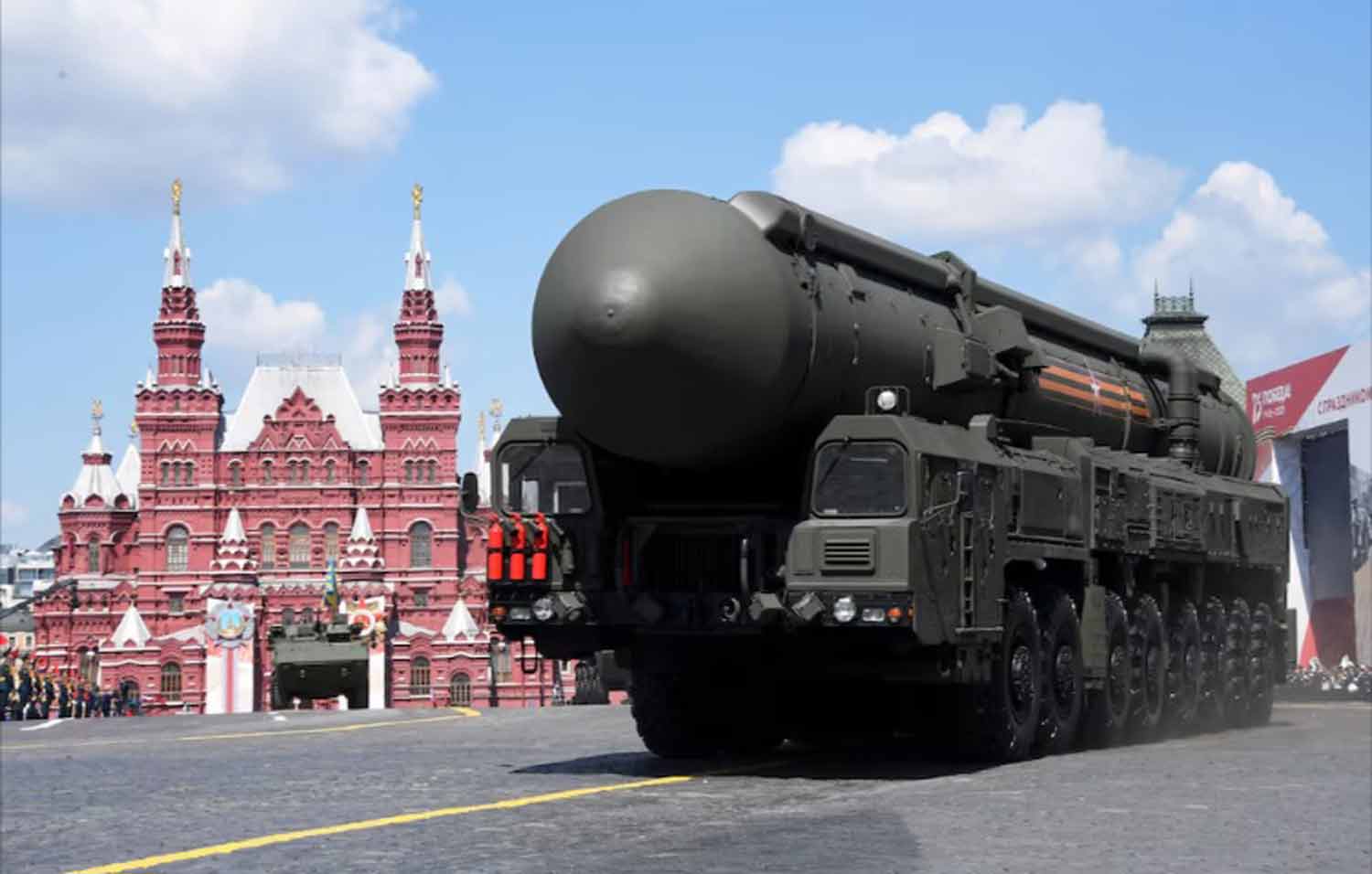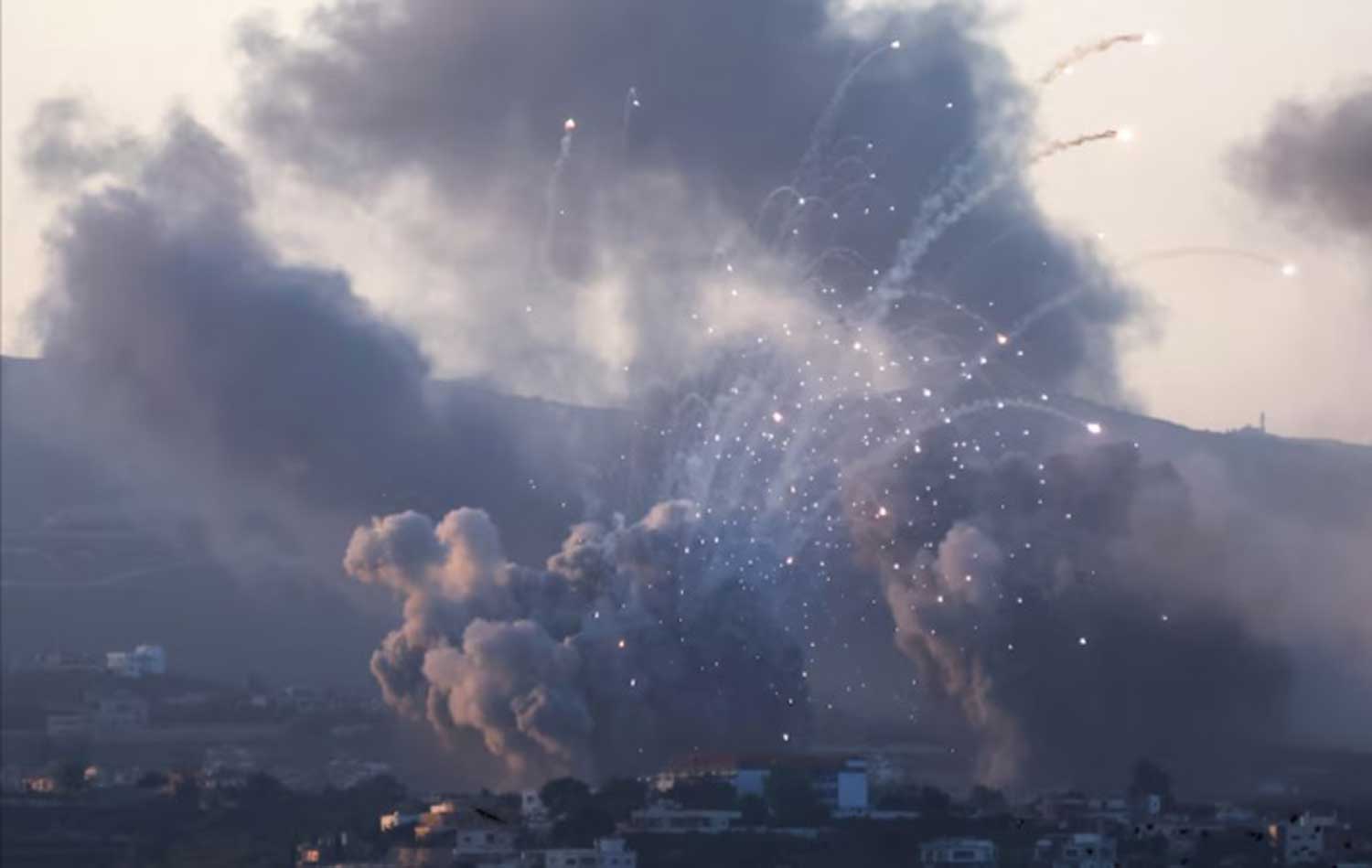President Vladimir Putin has established a “red line” for the United States and its allies, indicating that Moscow may resort to nuclear weapons if Ukraine is permitted to launch long-range Western missile strikes deep into Russian territory. However, there are voices in the West questioning the sincerity of his threat.
This inquiry is pivotal for the ongoing conflict. Should Putin be bluffing, as Ukraine and some of its allies suspect, the West might feel emboldened to enhance its military assistance to Kyiv, undeterred by Moscow’s warnings. Conversely, if he is genuine, there is a significant risk—repeatedly emphasized by Moscow and recognized by Washington—that the situation could escalate into a global conflict.
In a recent development, Putin expanded the range of scenarios that could trigger Russia’s use of nuclear weapons. He stated that such a response could occur following a substantial cross-border conventional assault involving aircraft, missiles, or drones. Additionally, any nuclear power that supports a nation attacking Russia would be deemed complicit in that aggression.
Both criteria are directly relevant to the potential scenario that could unfold if the West permits Ukraine to launch strikes deep into Russian territory using Western long-range missiles, such as U.S. ATACMS and British Storm Shadows. Putin has indicated that such actions would require support from Western satellites and targeting systems.
Nikolai Sokov, a former Soviet and Russian diplomat, remarked, “It was a very clear message: ‘Don’t make a mistake – all these kinds of things may mean nuclear war.'”
Bahram Ghiassee, a nuclear analyst based in London at the Henry Jackson Society think tank, connected the timing of Putin’s statements to Ukraine’s efforts to secure long-range missiles from the West, particularly as President Volodymyr Zelenskiy is advocating for this support with U.S. President Joe Biden this week.
“Putin is essentially saying: just stop it right there,” Ghiassee noted.
nuclear blackmail
Kyiv’s response was immediate, with President Zelenskyy’s chief of staff accusing Putin of engaging in “nuclear blackmail.” Anton Gerashchenko, a former adviser to Ukraine’s internal affairs minister, expressed on X that he views this as another instance of Putin’s bluster, asserting, “This is yet another bluff and demonstration of Putin’s weakness. He will not dare to use nuclear weapons because that will make him a complete outcast.”
U.S. Secretary of State Antony Blinken characterized Putin’s threats as irresponsible and ill-timed, noting that this is not the first occasion on which Putin has “rattled the nuclear sabre.”
Andreas Umland, an analyst at the Swedish Institute of International Affairs, suggested that Putin is engaging in psychological tactics. He stated, “This is a psychological PR operation by the Kremlin, lacking substantial backing. It aims to intimidate leaders and voters in nations that support Ukraine.”
Fabian Hoffmann, a doctoral research fellow and defense expert based in Oslo, remarked that while Putin’s statements should not be dismissed, it is crucial to avoid overreacting. “Russian nuclear use is not imminent,” he noted on X, adding that concern should only arise when Russia indicates actual preparations.
Hoffmann elaborated that potential next steps could involve removing warheads from storage and pairing them with delivery systems for a tactical strike, followed by preparations for large-scale nuclear deployment, such as readying silos and alerting bombers—actions that U.S. intelligence would likely detect.
Security expert Mark Galeotti commented, “While talk is easy and can have political ramifications, there is no evidence of a genuine willingness to use nuclear weapons, and we would be able to detect such intentions if they were to arise.”
clear warning
Putin has provided more detailed insights than before regarding the conditions that might lead to the use of nuclear weapons. His spokesperson indicated on Thursday that these remarks were intended to convey a warning to Western nations about the severe repercussions they would face if they engaged in attacks against Russia.
However, the proposed adjustments did not fully align with the expectations of some more aggressive commentators. Notably, Sergei Karaganov has advocated for a limited nuclear strike in Europe to “sober up” Russia’s adversaries and compel them to take its nuclear deterrent seriously.
Practically, these changes expand Russia’s nuclear protection to include Belarus, a key ally. They also lower the threshold for nuclear engagement, suggesting that such action could be warranted in response to a conventional attack that poses a “critical threat to our sovereignty.” Previously, the nuclear doctrine referred to threats against “the very existence of the state.”
Putin made this announcement in a four-minute video while addressing the nine members of a security council that convenes biannually to discuss nuclear deterrence strategies. He emphasized that the use of nuclear weapons is an extreme measure and that Russia has always approached this issue with caution.
Ministers and intelligence officials listened attentively, with some occasionally fidgeting or shuffling papers. One participant, Alexei Likhachev, the head of the state nuclear corporation Rosatom, took meticulous notes.
However, the primary audience for Putin’s message was in Kyiv, Washington, and London. Yevgeny Minchenko, a Russian political consultant, interpreted the revised doctrine as a clear warning to Ukraine and the West against further escalation of the conflict. He articulated the message as, “If you attempt to harm us through your proxies, we will retaliate against both your proxies and you.”
Sergei Markov, a former Kremlin advisor, noted that these changes could pave the way for Russia to deploy tactical nuclear weapons in specific scenarios, particularly in relation to Ukraine.
Markov stated on his official blog that the threshold for deploying nuclear weapons has been significantly reduced, making it more likely for Russia to utilize them. He explained that the shift in nuclear doctrine was prompted by the perceived threat of a complete escalation from the West, which believes that Russia would refrain from being the first to employ tactical nuclear weapons.
However, Russia is now asserting its readiness to do so. Markov indicated that Russia might consider using tactical nuclear weapons against Ukraine or targeting air bases in Romania or Poland, particularly if Ukrainian aircraft were to launch missions from those locations, especially with support from U.S. or British satellites, and if those jets were used to attack Moscow or central Russia.
not only as a warning
Igor Korotchenko, a military analyst frequently featured on state television, stated that the recent adjustments were essential due to the West’s disregard for numerous prior warnings against escalating tensions, including Russian military drills over the summer that simulated the deployment of tactical nuclear weapons.
“Western adversaries no longer acknowledge any ‘red lines,’ operating under the belief that supplying arms to Ukraine and conducting Western-supported strikes deep within Russian territory will not provoke a nuclear response,” Korotchenko remarked in an interview with the daily Izvestia.
Vladimir Avatkov, a member of an official advisory body to President Putin on international matters, noted that the announcement of these doctrinal changes positioned Moscow to preempt any Western decisions regarding missile support for Ukraine.
“Let them ponder this now,” he stated on Telegram. “This serves not only as a warning but aims to restore the fear they have completely lost, potentially prompting some strategic reconsideration.”
The modifications received strong support from Russian nationalists and war bloggers, many of whom have long pushed for the use of nuclear weapons to compel Ukraine’s surrender, sparking discussions about what circumstances might justify a nuclear response.
Dmitry Medvedev, deputy chairman of Russia’s Security Council and a former president, cautioned that Putin’s statements should prompt Ukraine and the West to reconsider their positions.
“The mere alteration of the regulatory framework governing our country’s nuclear capabilities may temper the enthusiasm of those adversaries who have not yet abandoned their instinct for self-preservation,” he commented in a statement.
akin to children
Sokov, a former Russian diplomat, expressed a notable frustration in Moscow regarding the West’s apparent indifference to its numerous nuclear warnings. He pointed out that during three rounds of military exercises this year, which were intended to simulate the launch of tactical nuclear missiles, there were widespread complaints in both the media and among experts about the lack of attention from Western nations.
“Consequently, they have chosen to amplify their message,” Sokov remarked. “Putin seems to view the West as akin to children, requiring detailed explanations for even the simplest matters because they fail to comprehend the gravity of the situation.”
Sokov voiced his apprehension over the “careless rhetoric” among politicians and analysts who claim that the West has disregarded several Russian red lines without consequence—citing the provision of tanks and F-16 fighter jets to Ukraine as examples. He emphasized that, in reality, the West has not yet crossed two clearly defined red lines set by Russia: the deployment of NATO troops in Ukraine and allowing Ukraine to launch Western long-range missiles into Russian territory.
“How can we predict Putin’s reaction when, to date, we have not actually crossed any of Russia’s red lines?” he stated during a phone interview, contending that such predictions are speculative rather than based on factual evidence. “I am genuinely worried about the careless discourse, especially as we may find ourselves in an entirely unprecedented situation… If the risks are not adequately considered, we could face a very unpleasant surprise.”
Discover more from Defence Talks | Defense News Hub, Military Updates, Security Insights
Subscribe to get the latest posts sent to your email.





